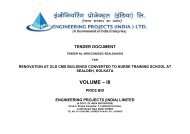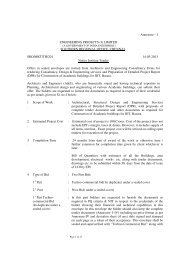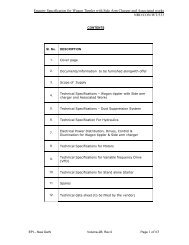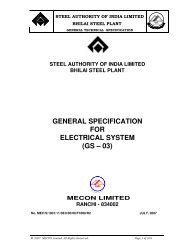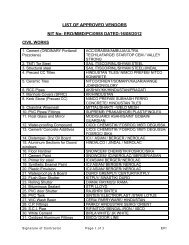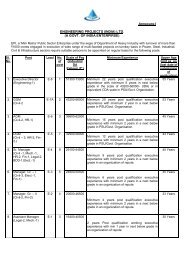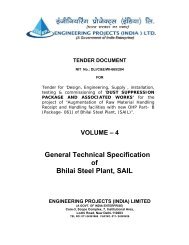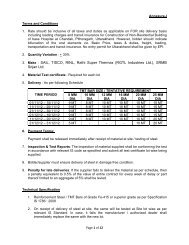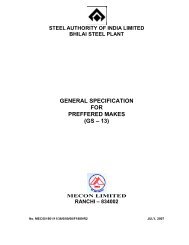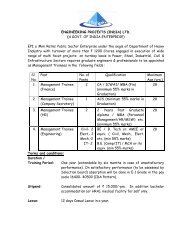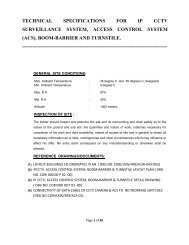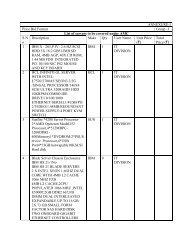SAIL General Technical Specification - Engineering Projects India Ltd.
SAIL General Technical Specification - Engineering Projects India Ltd.
SAIL General Technical Specification - Engineering Projects India Ltd.
Create successful ePaper yourself
Turn your PDF publications into a flip-book with our unique Google optimized e-Paper software.
© 2007 MECON Limited<br />
All rights reserved<br />
<strong>General</strong> <strong>Technical</strong> <strong>Specification</strong><br />
1.5.1 Any material brought to site which, in the opinion of the Engineer is damaged,<br />
contaminated, deteriorated or does not comply with the requirement of this specification<br />
shall be rejected.<br />
1.5.2 If the routine tests or random site tests show that any of the materials, brought to site, do<br />
not comply in any way with the requirements of this specification or of I.S. Codes as<br />
applicable, then that material shall be rejected.<br />
1.5.3 The Contractor at his own cost shall remove from site any and all such rejected material<br />
within the time specified by the Engineer.<br />
2.0 MATERIALS FOR CONCRETE<br />
2.1 Aggregates<br />
2.1.1 Aggregates shall comply with the requirements of IS: 383-1970 "Coarse and Fine<br />
Aggregates for Concrete". They shall be hard, strong, dense, durable, clean and free<br />
from veins and adherent coating, vegetable matter and other deleterious substances; and<br />
shall be obtained from approved sources. Aggregates shall not contain any harmful<br />
material such as pyrites, coal, lignite, shale or similar laminated material, clay, alkali, soft<br />
fragments, sea shells and organic impurities in such quantity as to affect the strength or<br />
durability of concrete. Aggregates which are chemically reactive with alkalies of cement<br />
shall not be used. Aggregates which are not sufficiently clean shall be washed in clean<br />
fresh water to the satisfaction of the Engineer.<br />
2.1.2 Testing<br />
2.1.3 Grading<br />
All aggregates shall be subject to inspection and testing. The Contractor shall submit<br />
samples for testing as may be required by the Engineer. Sampling and testing shall be<br />
carried out in accordance with IS: 2386-1963 "Methods of Test for Aggregates for<br />
concrete".<br />
The Contractor shall ensure that the full range of aggregate used for making concrete is<br />
graded in such a way as to ensure a dense workable mix. The delivery of aggregates will<br />
commence only when the Engineer has approved the samples and the quality and grade<br />
shall be maintained consistent and equal to the approved sample. Before construction<br />
commences, the Contractor shall carry out a series of tests on the aggregates and on the<br />
concrete made therefrom to determine the most suitable grading of the available<br />
aggregates. Once the most suitable grading has been found, the grading shall be<br />
adopted for the construction of the works and periodic tests shall be carried out to ensure<br />
that it is maintained.<br />
2.1.3.1 Size and grading of fine aggregates<br />
The grading shall conform to IS: 383-1970 and shall be within the limits of Grading Zone-<br />
III. The maximum size of particle shall be 4.75mm and shall be graded down. Sand<br />
containing more than 10% of fine grains passing through 150 micron sieve or having the<br />
fineness modulus less than 2 shall not be used for concrete work.<br />
2.1.3.2 Size and grading of coarse aggregates<br />
The nominal maximum size of the aggregates for each mark of concrete or for each type<br />
of work shall depend upon the description of the particular item in the Schedule of Items<br />
and/or according to relevant clauses of IS: 456-1978. The aggregates shall be well<br />
Civil<br />
Page 2 of 42<br />
GS-07



